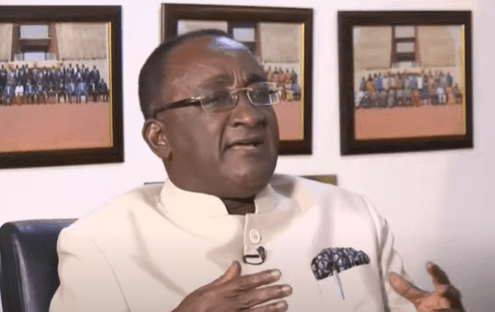The Minister for Food and Agriculture has indicated that the Planting for Food and Jobs programme by the Akufo-Addo-led government continues to actively impact the lives of farmers in the country.
According to Dr Owusu Afriyie Akoto, aside from the programme still being strong, its contribution to the agric sector has exceeded projections made by the incumbent government.
Speaking to host of PM Express on JoyNews, Evans Mensah, he said: "the program is going very strong. In fact, I will say that looking back for years, it has gone much better than we thought."
This he explained is due to the willingness of farmers to respond to the incentives given by the government.
"A lot more farmers have come on board. Don't forget we started with a target of 200,000 and last year, we reached out to 1.7million farmers. That meant that the budget for the subsidies was just exploding because the farmers streamed in to join the programme because they have seen the impact, the improved seeds and fertilizer have had on yields - where an acre for their whole lives has been doing 3-5 bags of maize, for instance. Some are making about 15-40 bags for an acre in Sissala East.
"So it is a total transformation," he reiterated.
Dr Owusu Afriyie Akoto stated that the less endowed farmers are those who benefited from the programme the most.
"They have seen the transformation in their lives and this is something that the government of Akufo-Addo has always aspired to bring to the people of this country," he added.
Addressing the issue of increased prices of foodstuffs, the Agric Minister noted that the problem is not new as prices of farm produce have shot up every year.
He blamed the challenges on the unstable rainfall patterns experienced in the country.
"Prices have gone up and prices have always gone up in this period every year. Ghanaian agriculture is dependent on rainfall patterns and there are two of them. The Savannah region where it is just one rainfall season, May to September and the southern part of the country, where there are two seasons.
"The major seasons start in April and the minor season in September. We should understand that if you look at the records, going back 60 years or more, every four or five years there is a drought and we were lucky in 2017 to 2019. We were hit in 2020. In the southern part of the country, there was drought. So obviously, that is the underlying factor."
According to Dr Afriyie Akoto, the issue of increased prices should be resolved latest by January next year although the government is hopeful the problem would be rectified in the two-three months.
Latest Stories
-
Gold Fields Ghana Foundation challenges graduates to maximize benefits of community apprenticeship programme
12 mins -
GBC accuses Deputy Information Minister Sylvester Tetteh of demolishing its bungalow illegally
24 mins -
Boost for education as government commissions 80 projects
35 mins -
NAPO commissions library to honour Atta-Mills’ memory
46 mins -
OmniBSIC Bank champions health and wellness with thriving community walk
48 mins -
Kora Wearables unveils Neo: The Ultimate Smartwatch for Ghana’s tech-savvy and health-conscious users
52 mins -
NDC supports Dampare’s ‘no guns at polling stations’ directive
55 mins -
Police officer interdicted after video of assault goes viral
1 hour -
KNUST’s Prof. Reginald Annan named first African recipient of World Cancer Research Fund
1 hour -
George Twum-Barimah-Adu pledges inclusive cabinet with Minority and Majority leaders
2 hours -
Labourer jailed 5 years for inflicting cutlass wounds on businessman
2 hours -
Parliament urged to fast-track passage of Road Traffic Amendment Bill
2 hours -
Mr Daniel Kofi Asante aka Electrician
2 hours -
Minerals Commission, Solidaridad unveils forum to tackle child labour in mining sector
2 hours -
Election 2024: Engagement with security services productive – NDC
2 hours

